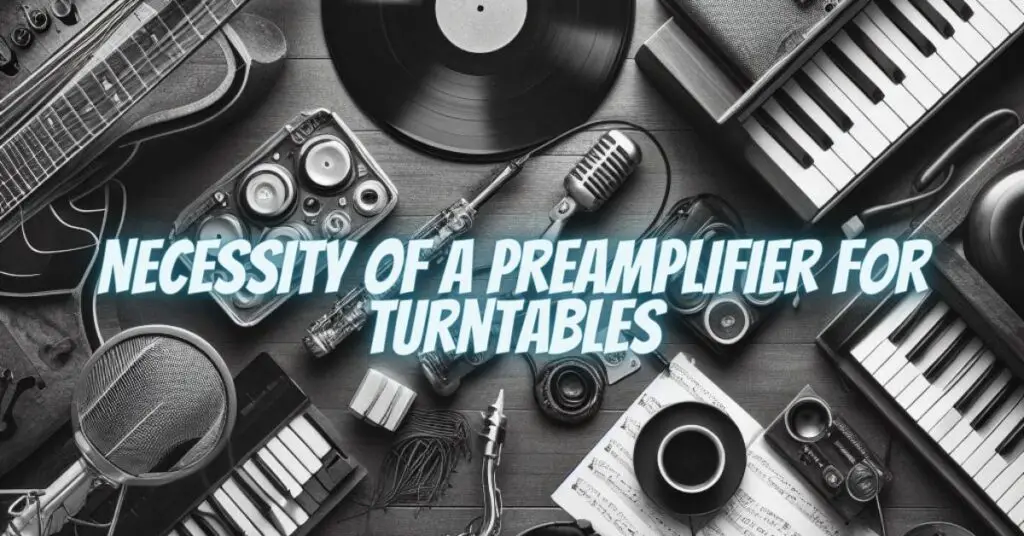Vinyl records have enjoyed a resurgence in popularity in recent years, with many audiophiles and music enthusiasts turning to turntables to experience the warmth and nostalgia of analog audio. However, when setting up a turntable, one common question arises: Is a preamp necessary? In this comprehensive article, we’ll delve into the world of turntables, exploring the role of preamplifiers and whether they are essential for your vinyl listening experience.
Understanding the Turntable
A turntable is a mechanical device that plays vinyl records. It consists of several components, including the platter, tonearm, cartridge, and stylus. The stylus, which is the needle that makes contact with the grooves on the record, picks up vibrations as it moves along the grooves. These vibrations are then converted into an electrical signal.
The Role of a Preamp
A preamplifier, commonly referred to as a “preamp,” is a critical component in the audio chain. Its primary function is to take the low-level, phono-level signal produced by the turntable’s cartridge and boost it to a line-level signal that can be processed by an amplifier or receiver and sent to your speakers or headphones.
The Importance of RIAA Equalization
One crucial aspect of vinyl playback that necessitates a preamp is the RIAA equalization curve. When records are pressed, the bass frequencies are attenuated, while the treble frequencies are boosted. This equalization curve, established by the Recording Industry Association of America (RIAA), is applied during the record cutting process to maximize sound quality and reduce record wear.
To restore the audio signal to its original, flat response, a phono preamp includes an RIAA equalization circuit. Without this correction, the audio from a vinyl record would sound overly treble-heavy and lack the proper tonal balance.
Why a Preamp is Necessary for a Turntable
- Phono-Level vs. Line-Level Signals: The primary reason a preamp is necessary for a turntable is the significant difference between the phono-level signal output by the cartridge and the line-level input expected by most amplifiers and receivers. A phono-level signal is considerably weaker and requires amplification.
- RIAA Equalization: As mentioned earlier, the RIAA equalization curve is vital for restoring the proper tonal balance to vinyl audio. A preamp includes this correction, ensuring that the audio from your records sounds as it should.
- Impedance Matching: Turntable cartridges have low output impedance, while most amplifiers and receivers expect a higher input impedance. The preamp also helps match these impedance levels, preventing signal loss and ensuring optimal audio quality.
- Noise Reduction: High-quality phono preamps are designed to be exceptionally low in noise, preserving the delicate nuances of the vinyl audio. Without a preamp, you risk introducing unwanted noise into your analog signal.
When a Preamp Might Not Be Necessary
In some cases, you may not need a dedicated phono preamp:
- Built-In Phono Preamps: Some turntables come with built-in phono preamps, making it possible to connect them directly to an amplifier or receiver with a line-level input.
- Amplifiers with Phono Inputs: Older amplifiers and receivers often feature a dedicated phono input that includes a built-in preamp.
- Active Speakers: Some powered speakers and active speaker systems have a built-in phono preamp, allowing you to connect your turntable directly to them.
In the world of vinyl playback, a preamp is typically necessary for a turntable to bridge the gap between the phono-level signal from the cartridge and the line-level input expected by most amplifiers and receivers. It plays a critical role in applying RIAA equalization, matching impedance levels, and reducing noise, all of which are essential for a high-quality vinyl listening experience.
While there are exceptions with turntables that have built-in preamps or amplifiers with dedicated phono inputs, a dedicated phono preamp remains a valuable addition for audiophiles and vinyl enthusiasts seeking the purest, most faithful reproduction of their vinyl records. Ultimately, whether a preamp is necessary for your turntable setup depends on your specific equipment and preferences for audio quality.


